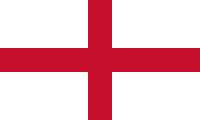 England (ˈɪŋɡlənd/) is a country that is part of the United Kingdom. It shares land borders with Scotland to the north and Wales to the west; the Irish Sea is to the north west, the Celtic Sea to the south west and the North Sea to the east, with the English Channel to the south separating it from continental Europe. Most of England comprises the central and southern part of the island of Great Britain in the North Atlantic. The country also includes over 100 smaller islands such as the Isles of Scilly and the Isle of Wight.
England (ˈɪŋɡlənd/) is a country that is part of the United Kingdom. It shares land borders with Scotland to the north and Wales to the west; the Irish Sea is to the north west, the Celtic Sea to the south west and the North Sea to the east, with the English Channel to the south separating it from continental Europe. Most of England comprises the central and southern part of the island of Great Britain in the North Atlantic. The country also includes over 100 smaller islands such as the Isles of Scilly and the Isle of Wight.
The area now called England has been settled by people of various cultures for about 35,000 years, but it takes its name from the Angles, one of the Germanic tribes who settled during the 5th and 6th centuries. England became a unified state in AD 927, and since the Age of Discovery, which began during the 15th century, has had a significant cultural and legal impact on the wider world. The English language, the Anglican Church, and English law—the basis for the common law legal systems of many other countries around the world—developed in England, and the country’s parliamentary system of government has been widely adopted by other nations.The Industrial Revolution began in 18th-century England, transforming its society into the world’s first industrialised nation. England’s Royal Society laid the foundations of modern experimental science.
England’s terrain mostly comprises low hills and plains, especially in central and southern England. However, there are uplands in the north (for example, the mountainous Lake District, Pennines, and Yorkshire Dales) and in the south west (for example, Dartmoor and the Cotswolds). London, England’s capital, is the largest metropolitan area in the United Kingdom and the largest urban zone in the European Union by most measures. England’s population is about 51 million, around 84% of the population of the United Kingdom, and is largely concentrated in London, the South East and conurbations in the Midlands, the North West, theNorth East and Yorkshire, which developed as major industrial regions during the 19th century. Meadowlands and pastures are found beyond the major cities.
The Kingdom of England—which after 1284 included Wales—was a sovereign state until 1 May 1707, when the Acts of Union put into effect the terms agreed in the Treaty of Union the previous year, resulting in a political union with the Kingdom of Scotland to create the new Kingdom of Great Britain. In 1800, Great Britain was united with Ireland through another Act of Union to become the United Kingdom of Great Britain and Ireland. In 1922, the Irish Free State was established as a separate dominion, but the Royal and Parliamentary Titles Act in 1927 reincorporated into the kingdom six Irish counties to officially create the current United Kingdom of Great Britain and Northern Ireland.
English Heritage is a governmental body with a broad remit of managing the historic sites, artefacts and environments of England. It is currently sponsored by the Department for Culture, Media and Sport. The charity National Trust for Places of Historic Interest or Natural Beauty holds a contrasting role. Seventeen of the twenty-five United Kingdom UNESCO World Heritage Sites fall within England.[249] Some of the best known of these include; Hadrian’s Wall, Stonehenge, Avebury and Associated Sites, Tower of London, Jurassic Coast, Saltaire, Ironbridge Gorge, Studley Royal Park and various others.
England’s economy is one of the largest in the world, with an average GDP per capita of £22,907. Usually regarded as a mixed market economy, it has adopted many free market principles in contrast to the Rhine Capitalism of Europe, yet maintains an advanced social welfare infrastructure. The official currency in England is the pound sterling, also known as the GBP. Taxation in England is quite competitive when compared to much of the rest of Europe—as of 2009 the basic rate of personal tax is 20% on taxable income up to £37,400, and 40% on any additional earnings above that amount.
Notes from Wikipedia









